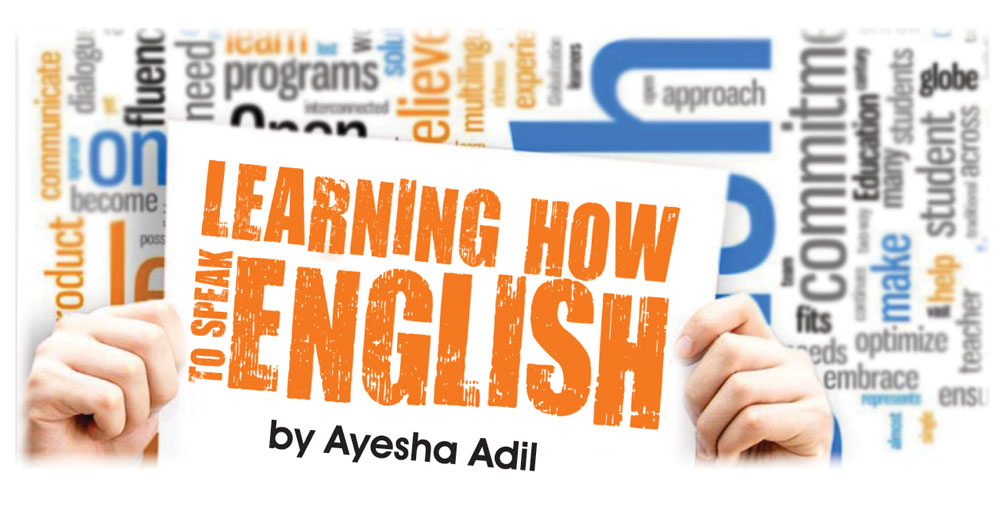An Epidemic
- 13 Apr - 19 Apr, 2024

Those who know how to speak English are not even the slightest bit concerned on the complexity or the dynamics of the language. In fact, they don’t even believe that they hold an asset that is of any value to them. However, the certain section of our society that struggles with it, those who are not fluent at it, know the scuffle all too well.
Many years ago, I had the immense pleasure of being a lecturer at a renowned nursing college. My students were mostly from the northern areas of Pakistan and as one student put it, “I come from such a tiny place in Swat that you won’t even be able to find us on the map.”
Teaching these students made me realise the power of a teacher. My students made me realise the real pleasure of being a teacher. The greatest reward I got as a teacher was teaching these students.
I taught each and every one of them how to write and speak good English. Movies like English Vinglish or Hindi Medium talk about the struggle. These movies are like windows into the minds of these learners, those that struggle day in and out to speak English well because they see it as a doorway to new chances in life and new opportunities.
However, I feel that learning this language might open doors and avenues for you, but it does not define you.
I am dedicating this story to all the people who have lived through life, feeling incompetent and less worthy because they could not speak English well. I want them to know that there is more to life than learning this language. And ironically, even though I teach IELTS – the International English Language Testing System, four skill exam; an exam that slots you into bands and scores – I am still of the opinion that there is more to life than being able to speak English well. Your entire education and abilities and skills cannot be brought down into nothingness, simply because you fail to express in English – their language. It should not be a test of your capabilities, as a well-trained and talented individual.
“Arghhh, I am so frustrated,” I put done my spoon and fork, much to Fawad’s surprise. I could not contain my anger for too long. I had been eating my dinner in silence, trying to let go of the nagging thoughts that I had brought home from work, but I couldn’t for too long. To Fawad’s amazement I simply burst out. He put down his fork and knife and asked me what was wrong.
“You know what they did today at school? I have this student who has been trying for so long to get a chance to speak at the assembly or be a part of some public platform and they simply scratched off her name and put the name of a girl who speaks English really well. I mean the principal spoke to me about it, but just sitting one down and thrusting your opinion is not enough, is it? She simply announced that she had made the switch. I would have trained this other girl really well. And isn’t it the job of a teacher to teach every student and make it possible for them to stand up before a crowd and share their voice.”

I had to pause for breath. I took this personally. I may be the privileged few that spoke and wrote English well but I was never boastful about it. As a teacher wasn’t it my duty to teach everyone equally? It made me very upset when equal opportunities were not given to every student and schools would hand pick students and sends them on to all the inter-school competitions out there.
“You know how hard I try, don’t you? I tell my kids that the classroom is a safe environment, where they can make their mistakes because that’s how they will learn. Then why it is that one student gets discriminated on accent or pronunciation and the other is chosen? Isn’t the school a place for all of them to be able to express themselves equally?”
“You can’t get all heated up on this you know. We still serve the British and colonialism. The school wants someone to represent them and showcase them in the public eye. They are trying to show, as if all their students speak good English through that single one.”
“Well, whatever the reason, I simply cannot take this lying down. Whenever the student of the month is chosen, or student of the year we only look for kids that are all-rounders and high achievers. What about the students who have been kind, empathetic or good Samaritans? They are simply shoved under the carpets, not given any consideration.”
“What can you do about it?” I liked how Fawad always got to the root of the issue. He would channelise my energy to try and find the solution to the problem.
“Well, as long as I work for the system, there’s really not much that I can do about it. I will have to bow down to the superstructure, the academic ethos basically the educational gods out there.”
One person alone can hardly fight the status quo or the system. Injustice will continue to exist because the people accept it as it is. That child will continue to feel worthless because he or she did not get the required grade, the required band score or the required accent. And what’s worse their parents will continue to dehumanise them and ridicule them because the results were not as they expected, or wanted. What will they tell the family or society? Will they admit their child scored a bad grade?
“If their adult child today worries only about making money to acquire material possessions instead of sharing their time and energy with their ailing parents then they only have to look back a few years and realise it was the same parents that drove them to this obsession and gave very little importance to building their character or their emotional intelligence.”
“You’re right. I get you.”
Fawad’s agreement did little to assuage me or relax my troubled mind. I was a victim as much as all of them. I was serving them just the same.
“Eat up Saima. You need your energy to fight the injustice of the world.”
I couldn’t help but laugh at this light humour. “That I do,” I said. “That I do.” •
COMMENTS